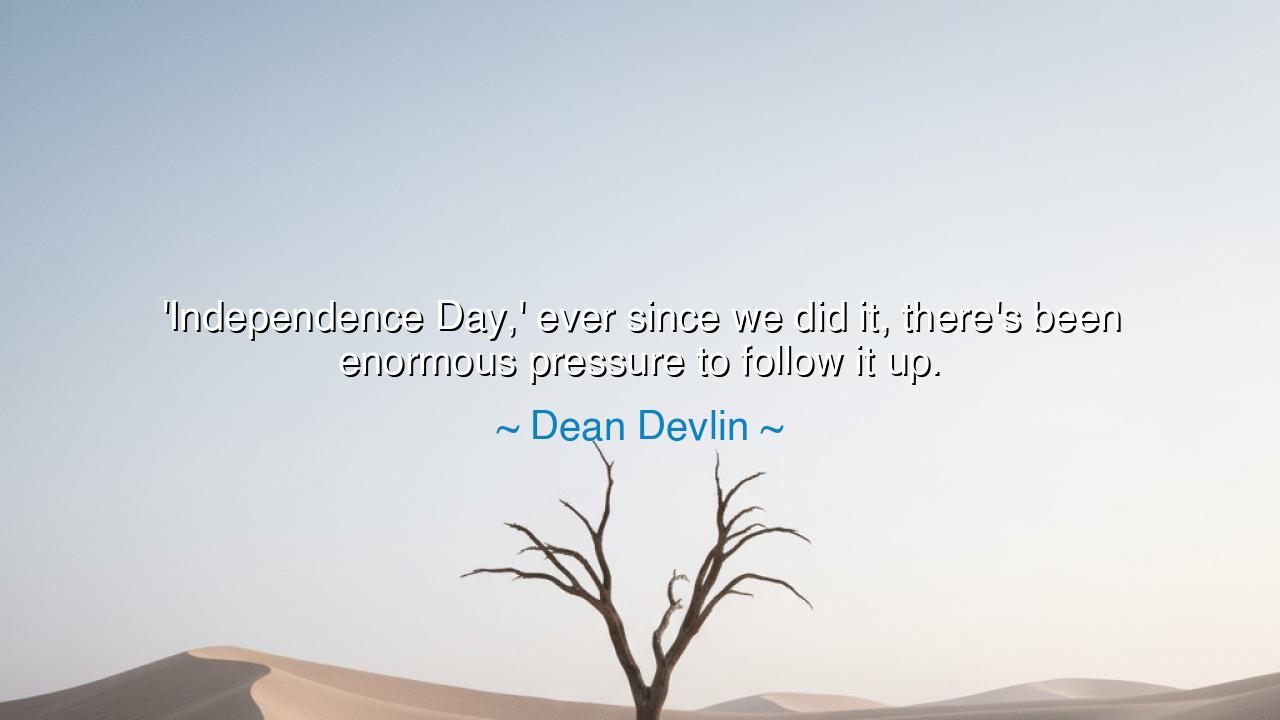
'Independence Day,' ever since we did it, there's been enormous
'Independence Day,' ever since we did it, there's been enormous pressure to follow it up.






“‘Independence Day,’ ever since we did it, there's been enormous pressure to follow it up.” Thus spoke Dean Devlin, co-creator of the mighty cinematic vision that captured the world’s imagination in 1996. His words are not merely about film or fame, but about the burden of success, that ancient and eternal trial faced by every creator, conqueror, and visionary. For when one achieves greatness, when the mountain has been climbed and the world has borne witness, the greatest struggle begins — not the ascent to glory, but the weight of expectation that follows it.
To understand the truth within Devlin’s reflection, one must first remember the phenomenon that was “Independence Day.” It was not merely a film about alien invasion; it was a hymn to unity, a declaration that even in the face of annihilation, humanity can rise as one. It was spectacle and soul, destruction and deliverance, a modern myth for a new age. When it struck the hearts of millions across the world, it did what all great works of art do — it transcended its time. Yet with triumph comes its shadow. Devlin and his partner, Roland Emmerich, having conjured a storm that shook the world, found themselves facing the question that haunts every artist who has touched greatness: what next?
This, then, is the heart of Devlin’s lament — the pressure to follow it up, the relentless demand to recreate what was once born of inspiration. The world, having tasted wonder, calls out for more. But inspiration, like lightning, does not strike twice upon command. It is a divine force, wild and untamable, visiting those who are ready, but not those who are desperate. Devlin’s words reveal the torment of every soul who has created something beloved — the paradox of success, where achievement becomes both a crown and a chain. For the higher one rises, the fewer the paths left to climb, and the more the crowd watches, waiting for either flight or fall.
The ancients understood this burden well. When Alexander the Great had conquered the known world before the age of thirty, he wept, not for joy, but for sorrow — for there were no more worlds to conquer. His greatness had trapped him in his own legend, leaving him forever chasing the ghost of his own glory. Likewise, when Homer penned his immortal epics, the world demanded more songs from the poet who had sung of gods and heroes. But how can one who has touched Olympus return to the marketplace? So too with Devlin — the maker of modern myth — who faced not an alien armada, but the quieter, more insidious battle against expectation.
Yet within his words lies not defeat, but wisdom. For Devlin reminds us that pressure is the measure of impact — that only those who have created something of worth feel the pull of the world’s longing for more. To feel such weight is proof that one has given something meaningful to others, something that stirs hearts and endures in memory. And though the demand to “follow it up” may at times feel like a prison, it is also a testament — a reminder that the world still believes in your power to create. In this way, expectation becomes both trial and tribute.
Consider the tale of Leonardo da Vinci, who painted The Last Supper, a masterpiece so divine that kings and popes demanded he replicate its splendor. Yet Leonardo, ever patient, moved on to other passions — machines, anatomy, philosophy. He knew what Devlin too must have known: that to chase one’s own shadow is folly. True greatness is not in repetition, but in renewal. It is not to imitate the miracle that has passed, but to seek the new miracle waiting to be born. The wise artist learns to let the past rest in reverence, and to face the future with courage unburdened by yesterday’s applause.
So, my child of creation and ambition, heed this lesson from Dean Devlin’s reflection: do not let the pressure of success become the thief of your joy. The world will always clamor for sequels, for repetitions of what it already loves — but the spirit of the creator must remain wild and free. What matters is not to outdo what you have done before, but to remain true to the fire that drove you to do it at all. For success fades, applause quiets, and fame passes like smoke — but purpose, once found, endures.
Therefore, create again, not to please the crowd, but to honor the flame. Let each new work be its own declaration of independence, born not of pressure, but of passion. For as Devlin teaches through his lament, the greatest victory is not in following up what you’ve done, but in continuing to create despite the weight of what you’ve achieved. In that perseverance — in that courage to begin again — lies the truest kind of greatness, one that no expectation can ever diminish.






AAdministratorAdministrator
Welcome, honored guests. Please leave a comment, we will respond soon